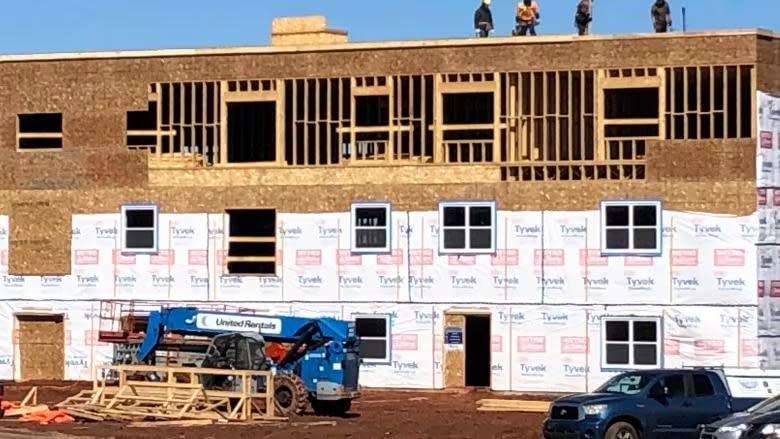Freeland announces housing affordability measures for first-time buyers, current owners

Deputy Prime Minister and Finance Minister Chrystia Freeland announced a number of housing affordability measures Thursday that she said will help buyers get their first homes and help current homeowners afford the homes they have.
"I really hope and believe the specific measures we announced today are going to provide a lot of comfort and a lot of hope to young Canadians," she said in Toronto.
Freeland announced that effective April 16, the amount first-time home buyers can withdraw from their RRSPs to make a down payment on their first home will rise from a maximum of $35,000 to $60,000.
"This, plus the Tax-Free First Home Savings Account, can be combined, which will give younger Canadians more tools to save what is actually needed," she said.
The Tax-Free First Home Savings Account program allows Canadians to save up to $8,000 per year toward a home, with a maximum lifetime contribution limit of $40,000.
Contributions to the accounts provide people with tax rebates. Growth in the accounts is not taxed and money can be taken out tax-free for a down payment.
Extending RRSP repayment period
Freeland also said she is more than doubling the time allowed for Canadians to start repaying their RRSP contributions once they have made a withdrawal to pay for the deposit on a home.
She said first-time home buyers who withdraw money from their RRSPs between Jan. 1 2022 and Dec. 31, 2025 will now have five years to begin repayments, instead of two.
Freeland also announced changes to the amortization schedule for mortgage repayments.
She said that beginning Aug. 1, first time home buyers with insured mortgages who purchase a new home will get 30 years to pay that mortgage back so "more younger Canadians can afford to pay that monthly mortgage on a new home."
Changes to the mortgage charter
Under the Canadian Mortgage Charter announced in the fall, the federal government requires that banks reach out to homeowners four to six months in advance of their mortgage renewal date to inform them of affordability options.
Freeland said Thursday lenders will now have to contact borrowers "up to 24 months in advance of a homeowner's mortgage renewal" to discuss options.
The Mortgage Charter also requires that lenders provide temporary extensions on the amortization period for mortgage holders who were facing financial difficulties. Freeland said Thursday that temporary measure is now being made permanent.
She said that "depending on a homeowner's circumstances," the amortization period can be made permanent, even for people with insured mortgages, and making that change will not come with any extra fees or penalties.
Other Mortgage Charter measures targeted at "vulnerable borrowers" under financial strain that were announced in the fall include:
Waiving fees and costs that would otherwise have been charged for mortgage relief measures.
Exempting insured mortgage holders from re-qualifying under the stress test when switching lenders at the time of a mortgage renewal.
Allowing borrowers to make lump sum payments to avoid negative amortization or sell their principal residence without incurring prepayment penalties.
Waiving interest on interest when mortgage relief measures result in mortgage payments that fail to cover interest payments on a loan.
PBO says Canada needs 1.3M new homes by 2030
Earlier Thursday, the parliamentary budget officer released a report saying Canada will need to build 1.3 million additional homes by 2030 to eliminate the country's housing gap. The new report looks at how many more homes are needed to restore Canada's vacancy rate to its historical average.
The report by Yves Giroux's office also accounts for the number of additional households that would form if sufficient housing were available. Based on those benchmarks, the PBO estimates that Canada would need to build 181,000 more homes per year than it currently does.
The report does not take into account recent federal efforts to bolster housing supply or Ottawa's new cap on temporary residents.
The Canada Mortgage and Housing Corporation has said Canada needs to build 3.5 million more homes by 2030 to restore affordability to 2003-04 levels.
Giroux said his estimate is much lower than that of the CMHC because he looked only at closing the gap between demand and supply.
The Liberal government has made a string of housing announcements ahead of the federal budget, largely aimed at increasing housing supply. The proposed measures include billions of dollars in low-cost loans to spur more rental construction, as well as infrastructure funding for provinces and municipalities.
Conservatives, Home Builders Association weigh in
The Canadian Home Builders' Association issued a statement welcoming the 30-year amortization period announced by Freeland, saying the measure will "go a long way" toward turning the market around.
"Through this announcement, the government has recognized that we need to get first-time home buyers into the market," said the association's CEO Kevin Lee.
The Conservatives did not directly address the new measures announced by Freeland Thursday. Instead, they issued a statement saying that after eight years of Prime Minister Justin Trudeau's government, Canada has been left with a "historic housing crisis."
"Canadians are living through this housing hell because Trudeau has failed to build enough homes for Canadians to live in," the statement said.
"This was confirmed again today by the Parliamentary Budget Office, who reported that Canada needs 1.3 million more homes than what is already forecasted to be built."


